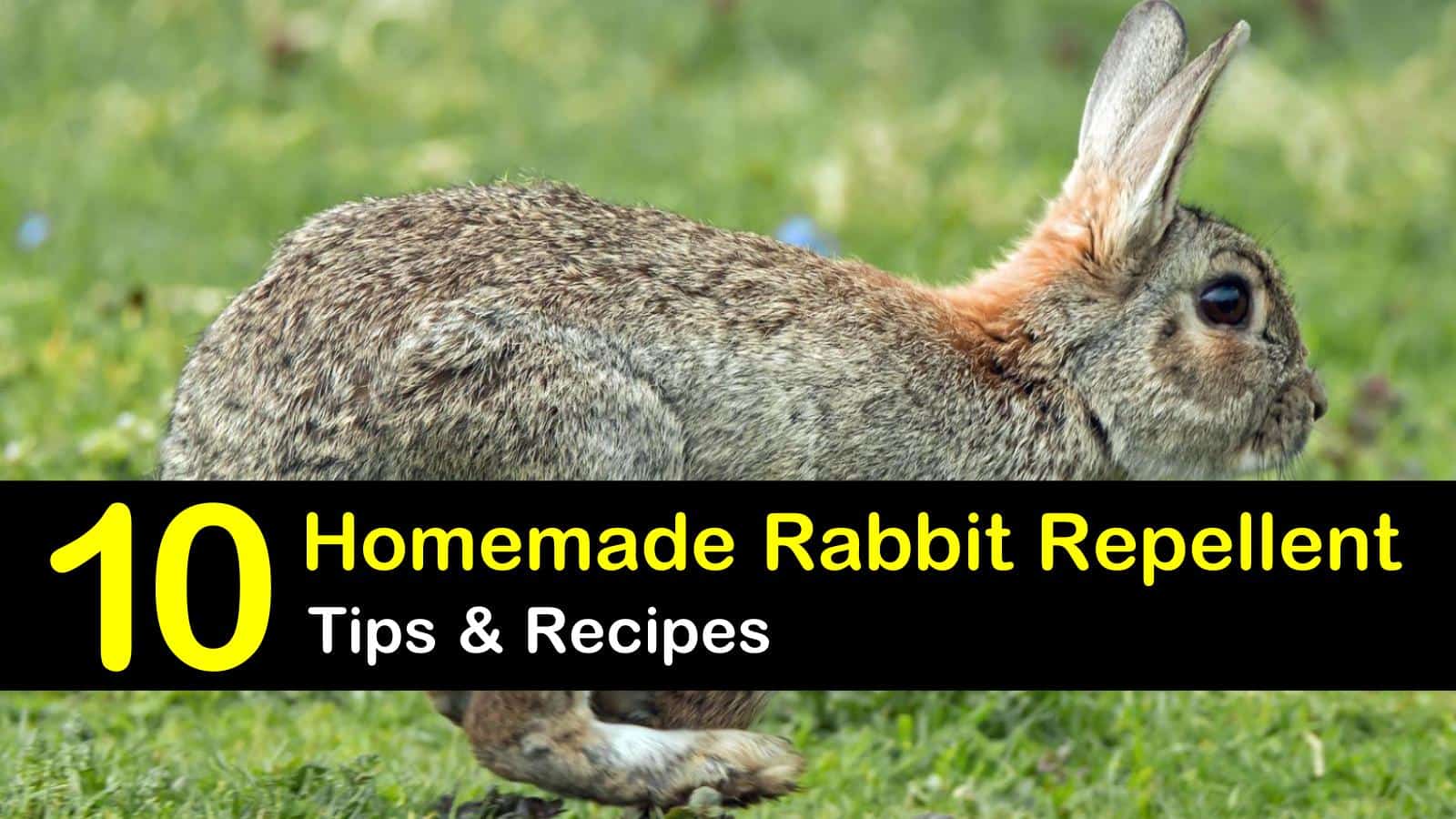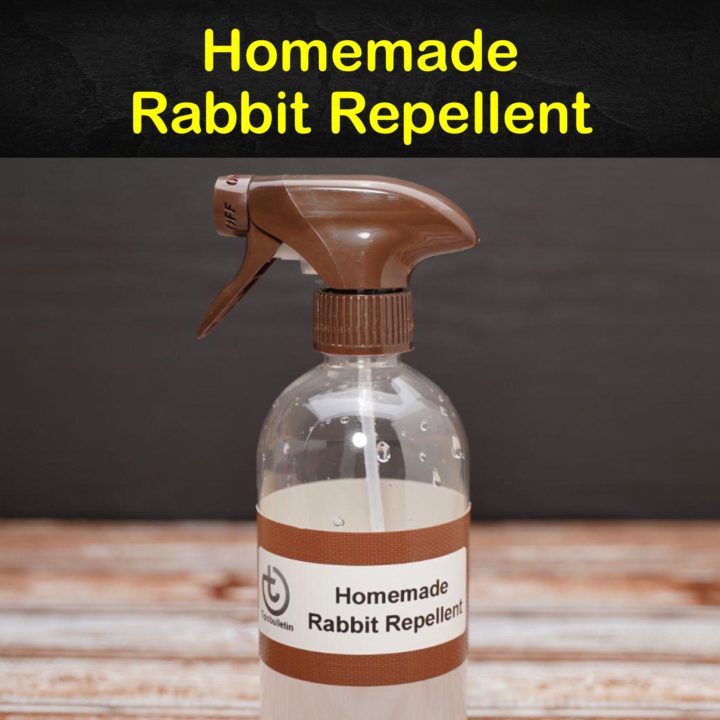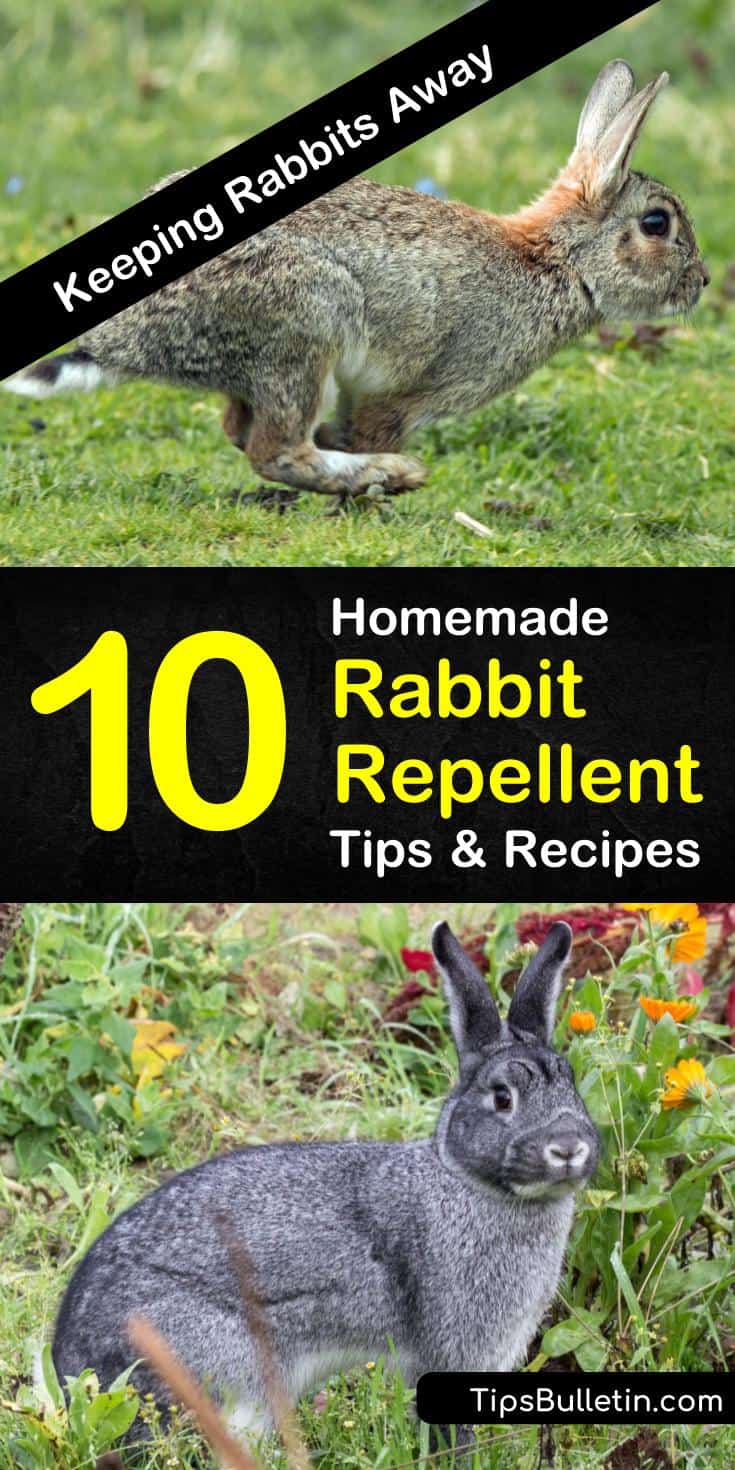As you get ready to plan your garden you need to think about what homemade rabbit repellent you plan to use. Rabbits may not cause as much damage to your garden and home as raccoons and deer do, but they can and will destroy shrubs and plants that are easy for them to reach.
Even if you have not seen an actual rabbit hopping through the yard, you can’t miss the signs of rabbit activity. Certain signs of rabbits in your garden include nibbled or destroyed plants, bark chewed off trees at ground level, leaves and stems eaten off young or newly planted plants, and rabbit droppings.
Using natural rabbit repellent methods work to discourage rabbits from destroying your garden. One of the best deer and rabbit repellent methods is landscaping your yard in a way that discourages them.

- Amazingly Easy DIY Rabbit Repellent Recipes & Tips
- Deer and Rabbit Repellent Fencing
- Homemade Rabbit Repellent Spray
- DIY Homemade Rabbit Repellent
- Create a Taste Barrier
- Establish an Odor Barrier
- Bone Meal as a Rabbit Repellent
- Commercial Rabbit Repellent Products
- Linseed Oil Rabbit Deterrent
- Cayenne Pepper Rabbit Repellent
- Irish Spring Soap Repellent
- Other Rabbit Control Ideas to Try
- Homemade Rabbit Repellent Recipe
Amazingly Easy DIY Rabbit Repellent Recipes & Tips
Rabbits tend to munch on plants located along the edges of gardens rather than the middle because the sides of your garden often provide natural hiding spots. Remove anything along the edges of your garden, including piles of brush or tall grasses, to discourage rabbits from entering in the first place.
Deer and Rabbit Repellent Fencing
A simple two-inch poultry mesh fence is an excellent deer and rabbit repellent method for keeping both herbivores away from a particular area. The diameter of the chicken wire needs to be smaller than an inch and the fencing secured with sturdy stakes.
To be effective as deer repellent the fence needs to be staked deep into the ground, but high enough to deter rabbits from jumping. If a chicken wire fence is not something you want, consider pop-up nets; make sure they are the self-supporting kind.
The netting anchors directly into your garden beds and is available for purchase in various sizes. These nets are compatible with raised garden beds as long as they are not taller than three inches.
An electric fence makes a good animal deterrent and is strongly recommended if there is a woodchuck issue, in addition to a rabbit problem. The downfall to electric fences is they cost more than other fencing material, and they can be tricky to maintain.

Homemade Rabbit Repellent Spray
Homemade sprays are easy to make, and you probably already have the required ingredients on hand. The following repellent sprays deter rabbits and won’t attract other garden pests.
Choose one from above and place all ingredients inside a spray bottle. Spray generously on garden plants to aid in keeping rabbits away. These sprays are safe to use in vegetable patches and flower beds.
DIY Homemade Rabbit Repellent
If you enjoy organic gardening and want to deter rabbits without harming them or your garden you need this homemade repellent spray. The spray keeps rabbits away and is safe for all plants, including those in your vegetable garden.
Peel garlic cloves and place into a milk jug. Add dish soap and crushed red peppers along with 1 gallon of water. Shake the container to mix ingredients.
Place the jug in the sun for two days to ensure the water becomes entirely concentrated with the ingredients. Shake well before using repellent. Apply to plants targeted by rabbits.
Reapply every five days for several weeks before you begin seeing results. In case of heavy rain, reapply as soon as the weather clears to ensure the mixture remains effective.
Create a Taste Barrier
If rabbits don’t enjoy the taste of your plants, they will stop eating them. Creating a taste barrier for plants can be done in one of two ways. The first method is covering the plants with chili powder, egg, or something else that has a strong taste. You can also make a spray using raw ingredients and some water.
Establish an Odor Barrier
What about the perimeter of my garden? The easiest way to protect the edge of any garden is to place strong-smelling items along the entire border to repel rabbits.
Odor barriers work well, as rabbits have a keen sense of smell. Grow strong-smelling plants, such as mint or lavender along the edge of your garden or place chili seeds, broken eggs, or garlic cloves around to form a barrier.
Bone Meal as a Rabbit Repellent
Blood meal and bone meal will both work to keep out wild rabbits. The bone meal needs to be dusted around the edges of the garden. As rabbits are herbivores, they find the smell of crushed bone to be repulsive so they should leave the area alone.
For even more protection you can sprinkle black pepper on top of the bone meal. Both should be reapplied each evening for several days until rabbits are no longer returning. To prevent future rabbits from coming to feed in your garden continue applying bone meal once or twice a month.
Commercial Rabbit Repellent Products
Not all commercial rabbit repellent products contain harsh chemicals. Many organic gardening experts agree on the use of a liquid fence product to repel rabbits.
The liquid fence clams it is a pet-friendly animal repellent as it contains natural ingredients. The products are also biodegradable and rain-resistant, so no more having to reapply after a heavy rainstorm.
Linseed Oil Rabbit Deterrent
Create your rabbit deterrent with a handful of ingredients that most of us usually have available.
When combining linseed oil, dish detergent, and water, the amount of linseed oil you use should be more than the amount of soap and water mixture.
Cayenne Pepper Rabbit Repellent
The best way to prevent rabbits from munching on your favorites plant is to alter the taste. The ingredients in this recipe will not harm your plants, but they will change their flavor.
Combine equal parts cayenne pepper and Tabasco sauce. Add a squirt of dishwashing soap and a gallon of water. Stir everything together and allow to sit in the sun to steep for two days.
Pour into spray bottles and generously spray the leaves and stems of all your plants, including vegetable plants. You can use garlic powder in place of Tabasco sauce.
Irish Spring Soap Repellent
If rabbits are ransacking your flower gardens and other garden pests, look into using Irish Spring soap as a critter repellent. Cut the soap into ½-inch pieces. Place two chunks of Irish spring soap in a drawstring pouch and secure inside.
Staple the bag to a wooden garden stake. Place the stakes about five feet apart throughout your garden. Cheesecloth can be used in place of the drawstring pouch.
Other Rabbit Control Ideas to Try
Some people have found the sprinkling vinegar or hot pepper flakes around their garden works to keep rabbits away. Others use corn cobs soaked in vinegar to repel rabbits and to keep stray cats out of your yard. Corn cobs will need to be resoaked every two weeks to remain active.
You might have heard about using mothballs to help solve your rabbit problem. Mothballs might work, but they are not advisable as they are not safe to use around children or vegetables due to the toxic chemicals they contain.
Homemade Rabbit Repellent Recipe

Homemade Rabbit Repellent
A great way to keep rabbits from eating your favorite plants.
Materials
- 1 gallon of water
- 1 ounce garlic powder
- 1 ounce cayenne pepper
- 1 drop dish soap
Tools
- Measuring cup
- Bucket
- Sprayer
Instructions
- Add the spices and dishwashing liquid to the water in a bucket and stir well.
- Let the mixture sit outside for two sunny days for the best results.
- Pour the repellent into the sprayer.
- Liberally spray areas and plants where rabbits are a problem.
Notes
Keep away from pets and children.

Thank you for reading our rabbit repellent tips. If you have found these homemade repellent tips useful, please take a minute to share our natural rabbit repellent ideas on Facebook and Pinterest so that others may benefit.